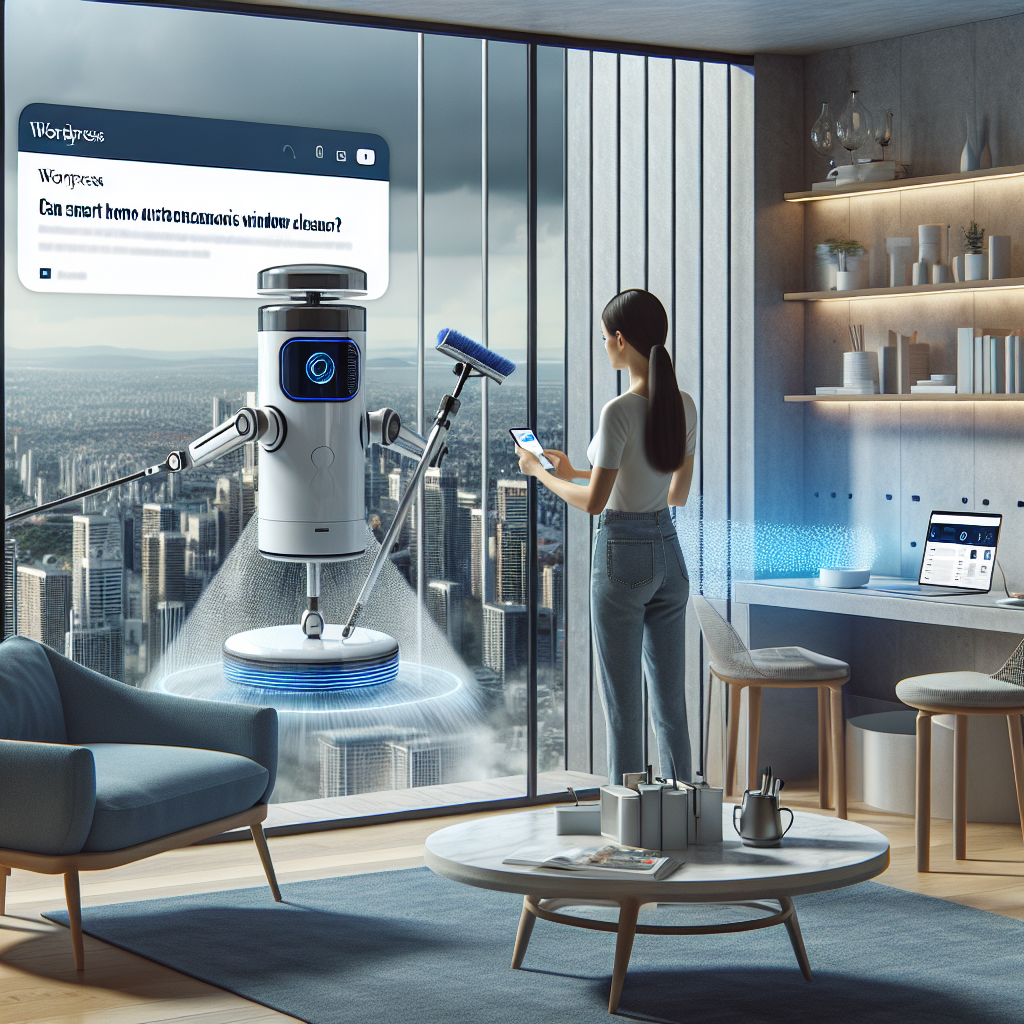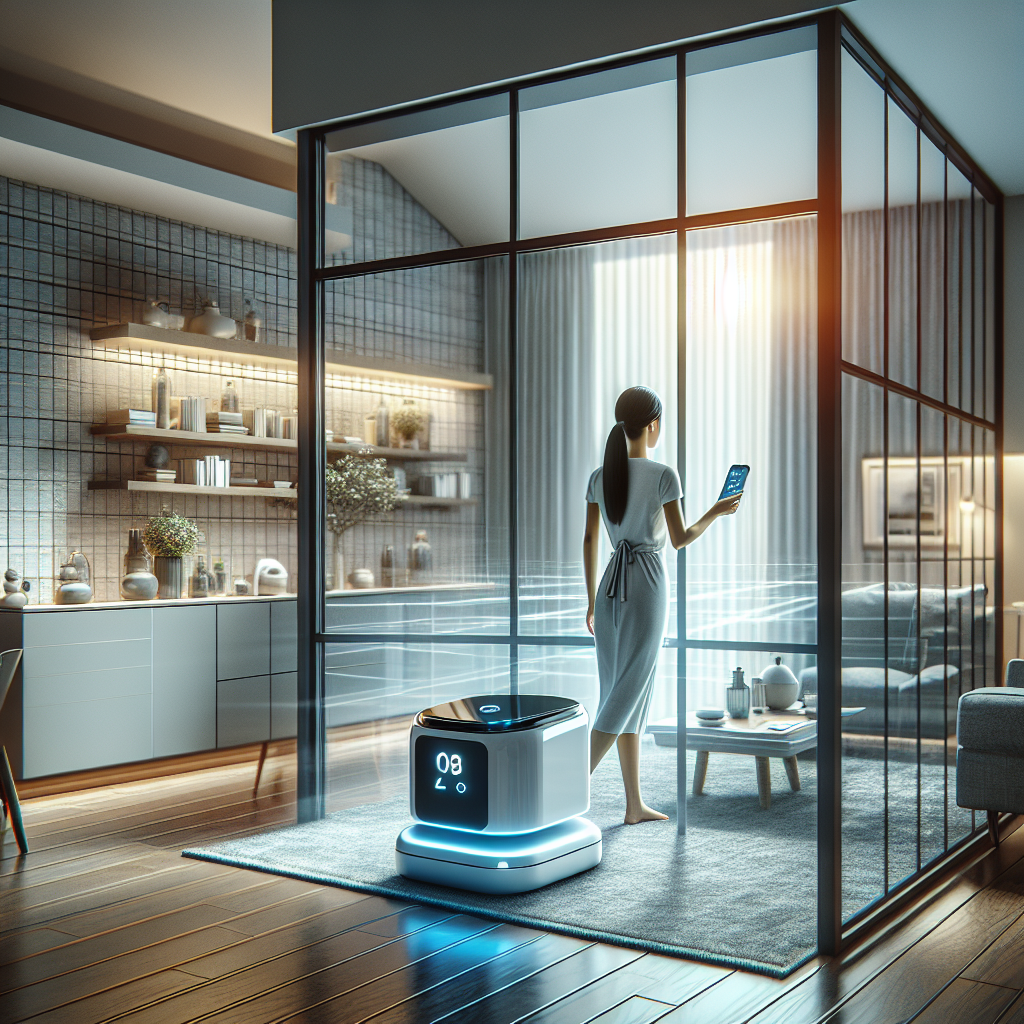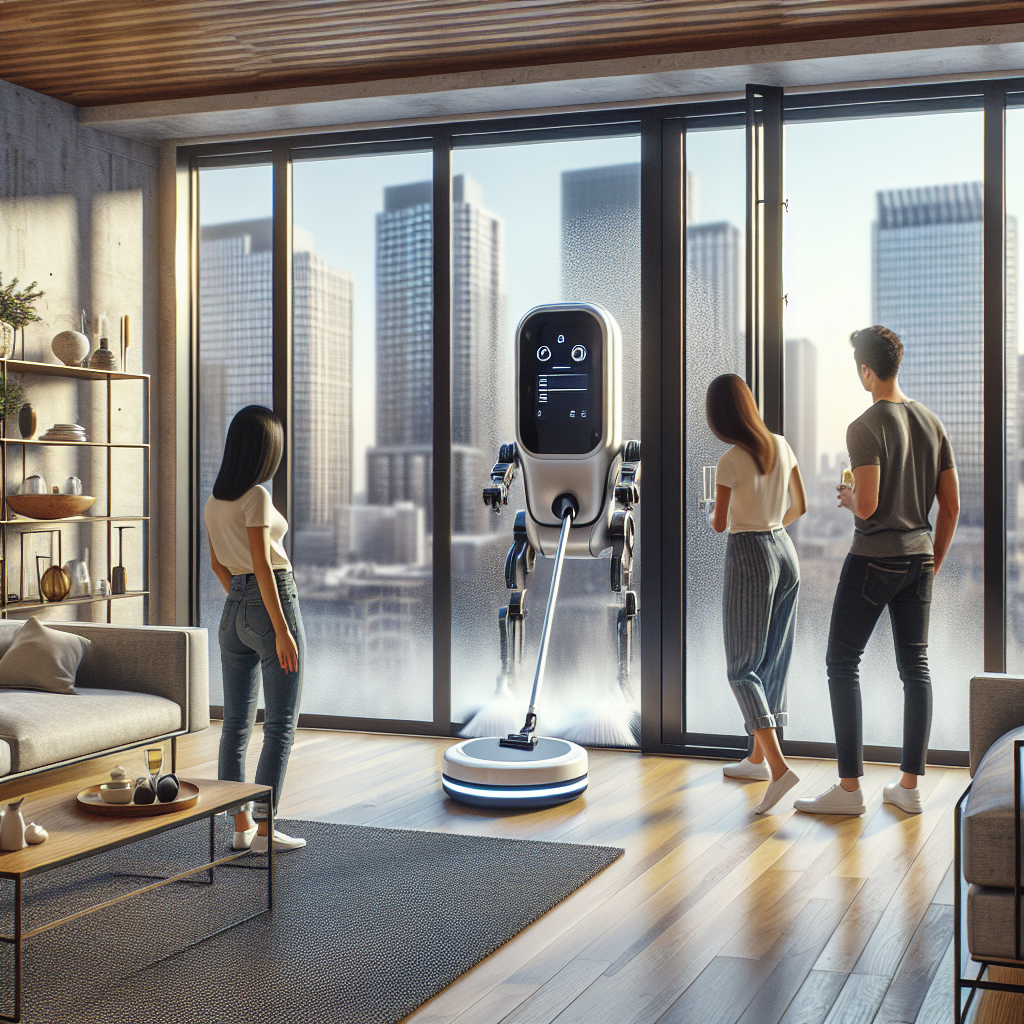In the constantly evolving realm of smart home technology, one innovation has caught the attention of homeowners everywhere: autonomous window cleaners. These futuristic devices promise to revolutionize the way we tackle one of the most dreaded household chores – cleaning windows. By utilizing cutting-edge technology such as sensors, artificial intelligence, and automated navigation systems, these smart devices are designed to effectively and efficiently clean windows without human intervention. Imagine the convenience of never having to struggle with ladders or squeegees again! Could smart home autonomous window cleaners truly transform the way we approach household chores? Let’s explore the exciting possibilities.
Yes, Smart Home Autonomous Window Cleaners have the potential to revolutionize household chores by making the task of cleaning windows more efficient, convenient, and hands-free. They can help save time and effort while ensuring that windows are cleaned regularly and effectively. This innovative technology can simplify the cleaning process and improve the overall cleanliness and appearance of a home.
Understanding Smart Home Autonomous Window Cleaners
In the realm of smart home technology, autonomous window cleaners represent a cutting-edge innovation designed to revolutionize household chores. These devices are equipped with advanced features that enable them to clean windows independently, without requiring manual intervention from the user.
Definition and Overview
Smart home autonomous window cleaners are robotic devices specifically designed to clean windows efficiently and effectively. They are equipped with sensors, AI technology, and cleaning mechanisms that enable them to navigate and clean various types of windows autonomously.
How Do They Work?
These devices typically utilize a combination of suction, cleaning pads, and squeegees to remove dirt, grime, and streaks from windows. They are equipped with sensors that allow them to detect edges, obstacles, and the boundaries of windows, ensuring thorough and precise cleaning. Some models also come with programmable features that enable users to schedule cleaning sessions at their convenience.
Benefits of Using Smart Home Window Cleaners
- Time-saving: Autonomous window cleaners eliminate the need for manual window cleaning, saving users valuable time and effort.
- Efficiency: These devices are designed to clean windows quickly and effectively, ensuring streak-free and spotless results.
- Safety: By delegating window cleaning tasks to autonomous devices, users can avoid the risks associated with climbing ladders or reaching tall windows.
- Convenience: With programmable features and remote control options, smart home window cleaners offer unparalleled convenience for users looking to streamline their household chores.
Advancements in Technology
- Integration of AI and Sensors
Incorporating artificial intelligence (AI) algorithms into smart home autonomous window cleaners allows them to learn and adapt to their surroundings. These devices can analyze the layout of windows, detect obstacles, and optimize cleaning patterns for efficiency. Sensors such as ultrasonic sensors and infrared sensors enable these cleaners to navigate without human intervention, ensuring thorough and precise cleaning.
- Connectivity Features
Smart home autonomous window cleaners are equipped with connectivity features that enable remote operation and monitoring. Through Wi-Fi or Bluetooth connectivity, users can control the cleaning schedule, monitor progress in real-time, and receive notifications once the task is completed. This integration with smart home systems allows for seamless integration into the household ecosystem, enhancing convenience and user experience.
- Safety Mechanisms
To ensure safe operation, smart home autonomous window cleaners are designed with advanced safety mechanisms. These may include anti-collision sensors to detect and avoid obstacles, as well as suction force detection to prevent falls. Additionally, some models are equipped with backup power sources or auto-retraction features in case of power outage, minimizing the risk of accidents during cleaning operations.
The Impact on Household Chores

Smart home autonomous window cleaners have the potential to significantly revolutionize the way household chores are approached and completed. This innovative technology offers several key benefits that can greatly impact the efficiency and effectiveness of maintaining a clean and well-kept home.
Time-Saving Benefits
Implementing a smart home autonomous window cleaner can result in substantial time savings for homeowners. By automating the task of cleaning windows, individuals can free up valuable time that can be better utilized for other activities. The autonomous nature of these devices allows them to work independently, requiring minimal intervention from the user. This means that homeowners can focus on other tasks or simply relax while the window cleaner does its job.
Efficiency and Effectiveness
Smart home autonomous window cleaners are designed to clean windows with precision and efficiency. Equipped with advanced technology such as sensors and artificial intelligence, these devices can navigate around obstacles, detect dirt and stains, and ensure thorough cleaning of the entire surface. This level of automation and accuracy can lead to superior cleaning results compared to traditional manual methods. Additionally, the consistent performance of autonomous window cleaners can help maintain the appearance of windows and improve the overall aesthetics of the home.
Convenience for Homeowners
One of the most significant impacts of smart home autonomous window cleaners is the convenience they offer to homeowners. With the ability to schedule cleaning sessions in advance or initiate them remotely through a mobile app, users can enjoy the convenience of having sparkling clean windows without the need for manual labor. This level of convenience not only simplifies the chore of window cleaning but also contributes to a more comfortable and enjoyable living environment.
Maintenance and Upkeep
The Impact on Household Chores
Maintaining and upkeeping smart home autonomous window cleaners is crucial to ensure their optimal performance and longevity. Here are some key points to consider regarding the maintenance and upkeep of these innovative devices:
-
Regular Cleaning Schedule: Just like traditional window cleaning tools, smart window cleaners require regular cleaning themselves. Dust, debris, and residue can accumulate on the device, affecting its cleaning capabilities over time. It is essential to clean the robot cleaner’s brushes, sensors, and suction mechanisms to prevent any hindrances in its operation.
-
Software Updates: Smart window cleaners often come equipped with software that may require periodic updates. These updates can include bug fixes, performance enhancements, or new features that improve the device’s functionality. Ensuring that the cleaner’s software is up to date can help maintain its efficiency and effectiveness.
-
Battery Maintenance: Autonomous window cleaners are powered by rechargeable batteries. Proper battery maintenance is essential to prolong the device’s lifespan. It is advisable to follow the manufacturer’s guidelines on charging and discharging the battery to prevent any issues related to power supply.
-
Inspecting and Replacing Parts: Over time, certain parts of the smart window cleaner may experience wear and tear. Components such as brushes, squeegees, or filters may need to be inspected regularly and replaced when necessary. Following the manufacturer’s recommendations on part replacement can prevent malfunctions and ensure smooth operation.
-
Safety Checks: Before each use, it is important to conduct safety checks on the smart window cleaner. Ensure that all safety features are functioning correctly, such as anti-drop sensors or obstacle detection mechanisms. Regularly inspecting these safety features can help prevent accidents or damage to the device or property.
In conclusion, proper maintenance and upkeep of smart home autonomous window cleaners are essential to revolutionize household chores effectively. By following a routine maintenance schedule, conducting software updates, caring for the battery, inspecting and replacing parts, and ensuring safety checks, homeowners can enjoy the convenience and efficiency of these innovative devices for years to come.

Addressing Safety Concerns
In the realm of smart home autonomous window cleaners, safety concerns are paramount considerations that must be addressed to ensure the seamless integration of this technology into household chores.
Fall Prevention Mechanisms
- Sensor Technology: Smart window cleaners are equipped with advanced sensor technology that enables them to detect obstacles and edges, reducing the risk of accidental falls.
- Safety Tethers: Some autonomous cleaners come with safety tethers that prevent them from plummeting to the ground in case of malfunction or loss of suction.
- Emergency Stop Buttons: Incorporating emergency stop buttons on the device or remote control allows users to quickly halt operation in case of unforeseen circumstances.
Handling Different Window Types
- Adjustable Pressure Sensors: Smart cleaners are designed with adjustable pressure sensors to cater to various window thicknesses, ensuring a secure grip without causing damage.
- Edge Detection Algorithms: Utilizing edge detection algorithms, these devices can navigate around frameless windows or uneven surfaces with precision, minimizing the risk of slippage.
User-Friendly Features for Safety
- Remote Monitoring: Many autonomous cleaners offer remote monitoring capabilities, allowing users to supervise the cleaning process from a safe distance.
- Scheduled Cleanings: By enabling scheduled cleanings, users can ensure that the device operates at times when they are not in close proximity to the windows, enhancing safety.
- Comprehensive User Manuals: Manufacturers provide detailed user manuals with safety instructions to educate users on proper usage and precautions to take during operation.
Comparison with Traditional Methods
When comparing smart home autonomous window cleaners with traditional methods, several key factors come into play:
-
Efficiency and Effectiveness: Autonomous window cleaners are designed to efficiently clean windows without human intervention, using advanced technology like sensors and AI algorithms to navigate and ensure thorough cleaning. In contrast, traditional methods such as manual cleaning with squeegees and cleaning solutions often require significant time and effort, especially for hard-to-reach areas or large windows. The precision and consistency offered by autonomous cleaners can lead to superior cleaning results compared to traditional methods.
-
Cost Comparison: While the initial investment in a smart home autonomous window cleaner may be higher than purchasing traditional cleaning supplies, the long-term cost-effectiveness can be advantageous. Traditional cleaning methods require regular purchases of cleaning solutions, squeegees, and other tools, which can add up over time. Autonomous cleaners, once purchased, typically only require occasional maintenance and electricity to operate, potentially leading to cost savings in the long run.

– Environmental Impact: In terms of environmental impact, autonomous window cleaners can be seen as more eco-friendly compared to traditional methods. Many autonomous cleaners are designed to be energy-efficient, using minimal electricity to operate. Additionally, the precise cleaning capabilities of autonomous cleaners can reduce the need for excess water and cleaning solutions, contributing to a more sustainable approach to window cleaning. In contrast, traditional methods may involve more water usage and the disposal of cleaning chemicals, which can have negative environmental consequences.
Future Trends and Developments
Potential Innovations in Smart Home Window Cleaning
In the realm of smart home technology, continuous advancements in robotics and artificial intelligence are paving the way for potential innovations in autonomous window cleaning. Companies are exploring the integration of advanced sensors and cameras to enhance the cleaning process. These innovations aim to improve efficiency and effectiveness in cleaning various types of windows, from standard to large, hard-to-reach windows in high-rise buildings. Additionally, the development of self-navigating capabilities in window cleaning robots is anticipated to further streamline the chore, allowing for seamless operation without the need for manual intervention.
Integration with Smart Home Ecosystem
As smart home technology becomes increasingly interconnected, the integration of autonomous window cleaners into the broader smart home ecosystem is a key trend to watch. Manufacturers are focusing on compatibility with popular smart home platforms such as Amazon Alexa and Google Assistant, enabling users to control window cleaning operations through voice commands or mobile apps. This integration not only enhances convenience but also opens up possibilities for automated cleaning schedules based on weather conditions or user preferences. The seamless integration of window cleaning robots with other smart devices in the home signifies a shift towards a more cohesive and efficient household chore management system.
User Feedback and Market Demand
User feedback and market demand play a crucial role in shaping the future of smart home autonomous window cleaners. As more consumers experience the benefits of hands-free window cleaning solutions, their feedback becomes invaluable for manufacturers looking to refine existing products or develop new features. Market demand for efficient and time-saving cleaning solutions is driving innovation in the sector, with manufacturers striving to meet consumers’ expectations for high-performance, user-friendly autonomous window cleaners. The evolving preferences of users, combined with the growing demand for smart home technologies, are likely to drive further advancements in autonomous window cleaning systems, making them a staple in modern households seeking convenience and automation in household chores.
FAQs: Smart Home Autonomous Window Cleaners
Can smart home autonomous window cleaners really revolutionize household chores?
Smart home autonomous window cleaners have the potential to significantly revolutionize household chores by automating the task of window cleaning. These devices are equipped with advanced technology such as sensors, artificial intelligence, and automatic cleaning modes that allow them to clean windows efficiently and effectively without human intervention. This not only saves time and effort for homeowners but also ensures that windows are cleaned regularly and thoroughly.
Are smart home autonomous window cleaners safe to use on all types of windows?
Smart home autonomous window cleaners are designed to be safe to use on a variety of window types, including glass, frosted glass, colored glass, and even mirrors. However, it is important to read the manufacturer’s instructions carefully and ensure that the device is compatible with the specific type of window you have. Some cleaners may not be suitable for use on certain surfaces, such as windows with tinted film or textured glass, so it is important to check before using the device.
How do smart home autonomous window cleaners work?
Smart home autonomous window cleaners typically work by attaching themselves to the window using suction or magnetic technology and then moving systematically across the surface to clean it. They are equipped with sensors that help them navigate around obstacles and detect the edges of the window, ensuring that they clean every part of the glass. Some cleaners also have features such as automatic cleaning modes, remote control capabilities, and scheduling options that allow users to customize their cleaning experience.
Can smart home autonomous window cleaners help save time and effort?
Yes, smart home autonomous window cleaners can help save a significant amount of time and effort when it comes to cleaning windows. Instead of spending hours climbing up ladders and reaching difficult-to-access windows, homeowners can simply attach the device to the window and let it do the work for them. This not only saves time but also reduces the risk of accidents and injuries associated with manual window cleaning. Additionally, regular use of the autonomous cleaner can help keep windows clean and clear throughout the year, making it easier to maintain a tidy and well-kept home.